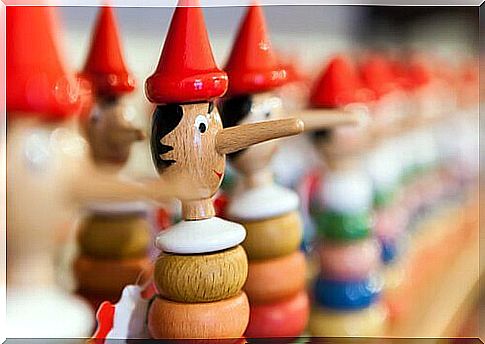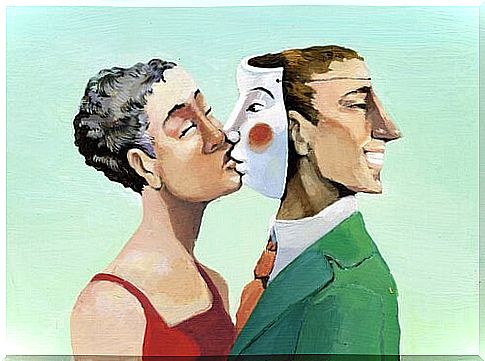Lies: Enemies Of Self-esteem

There are many ways of lying and many justifications we find for using lies. There are almost as many of them as there are people. They are useful, very useful. Sometimes, lies take us out of trouble, divert attention, and clear our minds. They are a way to manage a situation from which we don’t know how to get out.
However, it is a means that we could define as “short term”. The fact of freeing ourselves from a situation or not wanting to give pertinent explanations to it, in the long run, becomes a trap that goes to the center of our self-esteem. Lies also have consequences, both in relationships with others and in relationships with ourselves.
Why lie?

The lies could be exciting. At will they turn into adult pranks or pleasures guilty of the forbidden, which at a certain moment bring us benefits. You lie, you are deceived… .is something that, if it were not useful, would probably disappear. Among the various reasons that lead us to lie we remember:
- Self-need or self-deception
- Apparently fulfill the expectations of others
- Deforming reality to adapt it to what suits us or what it is convenient to hear from others
- Avoid punishment or shame
- To appear
- Get admiration
- Don’t worry our family
- Cover a friend who asks us a favor
- Call attention
All these reasons have one thing in common: fear. Whether it’s about others, the situation or admitting the truth to ourselves, fear is related to lies.
Why not lie?
We have made it very clear that lies are a tool that can take us out of uncomfortable situations, but that they do not provide solutions to problems. Lies relieve and release us from anxiety are in the moment, but not in the long term.
However, even if we know the consequences, we continue to lie. For example, when a man wants to convey an image of control or power, he remains imprisoned and clinging to a concrete style of communication and relationship.
This, in most cases, will lead to different consequences within the spectrum of personal feelings and thoughts, from the deepest to the most frivolous examination of conscience. Here are some consequences:
- Guilt feelings
- Social responsability
- Anxiety
- Escape from people or situations
- Consider the time spent lying as “wasted time”.
Unless you fulfill the requirements of a diplomatic, strategic, funny lie, or in the chaos where no one is harmed by it, the truth is that lies consume those who tell them.
Many personal resources are used to conceal, hide and manage situations or events, or to conceal them. For people who do, and who feel guilty, it is not easy and neither is getting out of such a situation.

“Little man, I don’t lie”
“Little man, I do not lie “, “I filter and select information” … Those who hide behind these famous phrases, it is good that they know that there are two main ways of lying:
- Conceal: on various occasions, we try to silence our conscience by telling ourselves that we are omitting information and that this is not the same as making up a story. True, it is not the same, but in the eyes of the psychology of the lie it belongs to the same concept of deception.
- Inventing or falsifying: in this case the information transmitted is modified; it is invented or deformed, deliberately. This type of deception is what grows and continues to grow as a person feels threatened, and must continue to feed that lie. However, this requires a greater effort for those who put it into practice. It needs a good memory, mental agility and dialectical resources.
Risks of lies
As we said before, lies are a missile at the heart of self-esteem. Lies presuppose a weight that directs people towards the path of anguish. What was initially easy and fortifying, because it made us obtain beneficial results, in the end is difficult to handle and manage, not only with others, but also with ourselves.
Reality is distorted and people who lie end up getting lost in that false identity that they were building, made up of deceptions and falsehoods. The worst thing about this situation is that it stops enhancing the beneficial virtues for those castles in the air built on quicksand.
When lies become pathological, psychologists define this condition as “fantastic pseudology”. There are some well-known cases, such as that of the famous Tania Head, who presented herself to the world as a victim of the 9/11 attacks, even going so far as to become the president of the World Trade Center survivors network …
We have all lied on occasion, out of personal necessity, out of pity, out of emotion and risk, out of friendship… Lies are a resource. However, there are limits that mark the convenience or otherwise of using them, and it will depend on the answers we will find to the following questions: am I okay if I lie? Am I harming others? It depends on each of you where you want or can go.









